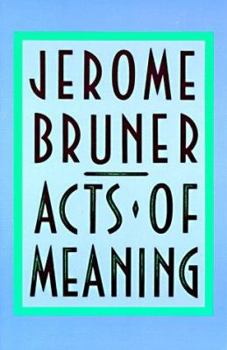Acts of Meaning: Four Lectures on Mind and Culture
Select Format
Select Condition 
Book Overview
Jerome Bruner argues that the cognitive revolution, with its current fixation on mind as "information processor," has led psychology away from the deeper objective of understanding mind as a creator of meanings. Only by breaking out of the limitations imposed by a computational model of mind can we grasp the special interaction through which mind both constitutes and is constituted by culture.
Format:Paperback
Language:English
ISBN:0674003616
ISBN13:9780674003613
Release Date:January 1990
Publisher:Harvard University Press
Length:208 Pages
Weight:0.56 lbs.
Dimensions:0.6" x 5.5" x 8.3"
Related Subjects
Behavioral Sciences Clinical Cognitive Ethnopsychology Health, Fitness & Dieting Health, Fitness & Dieting Humanities Internal Medicine Medical Medical Books Medicine Mental Health Philosophy Politics & Social Sciences Psychiatry Psychology Psychology & Counseling Science & Math Social SciencesCustomer Reviews
5 ratings
Excellent book!!!
Published by Thriftbooks.com User , 15 years ago
Excellent book!!! He is great in writing about developing more than one language... at a time. A great expert in the PYP system, given in some international schools, teacher recommend it to me, and he was correct!
Continuing relevance and importance
Published by Thriftbooks.com User , 16 years ago
This is an outstanding and important work although some years have passed now since its publication and Bruner has written two other books further setting out his narrative understanding of identity and meaning - amazing, given his age. He was one of the originators of the "cognitive revolution" beginning in the late 1950s and this is a mature work of one of its most creative thinkers, brilliantly presented. His reflections on the early days of the so called cognitive revolution are most interesting although I think perhaps now seen with greater clarity than was then apparant, and the points at which he believes it has since lost some of its original purpose are important considerations for all in this field. My memory of him as a teacher in graduate work at Harvard has him although already well established in cognitive studies then more like a representative the Tolman tradition (vs. the Hullians, then represented in the same seminars by George Mandler who was in the process of moving over to the cognitive camp but not yet there). We have travelled a long way since then, and the position he took in this work in 1990 is more relevant than ever today.
A well written and enjoyable book
Published by Thriftbooks.com User , 22 years ago
The measure of this book is the fact that I underscored something on almost every page. Bruner shows with earnestness the strengths of cognitive psychology, while keeping a level and fair estimate of traditional positivist psychology. The fact of the matter is that a cognitive psychology (or pedagogy) is a dynamic, empirically sound theory. It could provide inspiration for anyone, regardless if he is working in a classroom or in any other workplace. The cognitive model and its ideas about understanding would, I believe, be especially useful in management.
Just What Are The Proper Causes Of Human Action?
Published by Thriftbooks.com User , 23 years ago
The juggernaut of Cognitive Psychology has created enough havoc, decries Bruner, and it is now time to re-structure the revolution back to its original goals: "meaning-making." The computer model of intelligence advocated by behavioralists has reduced human intelligence to a mere system of processing information, and rarely is there any allowance in this empiricism for an individual's construction of meaning.Further, Bruner stresses the influence of culture on the individual, stating, "human beings do not terminate at their own skins; they are expressions of their culture." There is a constant dialogue between the individual and culture, with the individual searching and constructing meaning, and hence, building culture. One way in which we find meaning is in the construction and interpretation of narratives. Bruner demonstrates that narratives are a construct of meaning and should be respected. He writes, "culture and the quest for meaning within culture are the proper causes of human meaning."Yes, buy and read this book, often; Bruner communicates stimulating ideas that have helped me in constructing my own meanings. I endorse it enthusiastically.
One of the great reflections on psychology's project
Published by Thriftbooks.com User , 24 years ago
Someday, I suspect, ACTS OF MEANING will be regarded as one of the more important psychology texts at the end of the 20th century. In it, Jerome Bruner, a founder of the "Cognitive Revolution" and witness to psychology for more than 60 years, surveys what went wrong with the revolution he helped start and where psychology ought to be in the generation ahead. The error, he argues, came when psychology adopted the metaphor of the computer as an information processing device to describe the mind. In doing so, psychology severed itself from ordinary human experience and its own 19th century roots. He proposes that humans are concerned centrally with questions of "meaning" and that the computer metaphor will never allow psychology to answer meaning questions with any conviction. Rather, a narrative metaphor -- of humans as storytellers -- is essential to reach the level of meaning. He further details the deficits of a decontextualized psychology which fails to take culture seriously. Bruner's language and style are both rich and deceptively straightforward. There is a magisterial sense that he has seen psychology in all its variations and has a vision of how it can fashion an integration which does justice to that variety. His chapter notes contain a particularly wonderful set of references should a reader wish to pursue his ideas more fully. Be prepared: this is terrific stuff.




